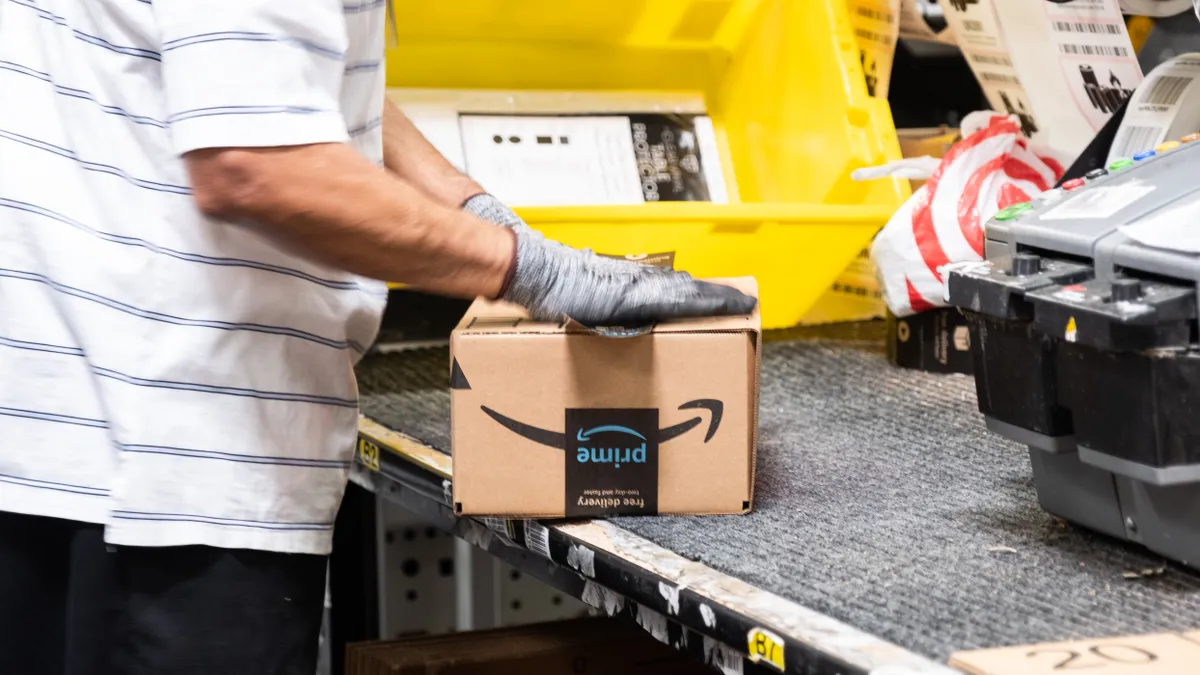Dive Brief:
- National labor union leaders sent a letter to Jeff Bezos, Amazon founder and CEO, April 1 demanding safety improvement for U.S. warehouse workers amid the COVID-19 pandemic. The group included the AFL-CIO; the Retail, Wholesale and Department Store Union, and the American Federation of State, County and Municipal Employees.
- The unions called for the "swift" reinstatement of Chris Smalls, a worker at an Amazon warehouse in Staten Island the company said was terminated for violating social distancing guidelines, including orders to remain home after coming in contact with a coworker who tested positive for COVID-19. However, Smalls alleged he was fired for organizing a protest March 30 over fears of a COVID-19 outbreak at the warehouse. New York Attorney General Letitia James is calling on the National Labor Relations Board to investigate Amazon's actions.
- Union leaders said unsafe working conditions persist and "the actual situation in warehouses does not match Amazon's public relations statements." They called for the temporary closure of Amazon warehouses in the U.S. and full pay for workers until safety is improved. The unions also called for full compensation for workers who cannot return to work due to an ill family member or the need to self-quarantine, and a public statement from Amazon listing improved protocols for worker safety.
Dive Insight:
Hundreds of thousands of workers in distribution centers find themselves on the front lines as e-commerce has increased due to COVID-19 quarantines and social distancing. Companies are being held accountable by workers and consumers to provide a safe work environment.
A day after unions demanded Amazon increase worker protection, Dave Clark, the company's senior vice president of worldwide operations, posted a blog update on safety precautions. Temperature checks for employees began March 29 in select cities across the U.S., Clark said. Anyone with a temperature over the Centers for Disease Control and Prevention recommended 100.4 F was asked to return home, and could only return after three days without a fever, according to the blog post.
Procurement teams are working to keep a steady supply of disinfectant wipes and hand sanitizer, and "millions of masks we ordered weeks ago" started to arrive, Clark said. "Any N-95 masks we receive we are either donating to healthcare workers on the front lines or making them available through Amazon Business to healthcare and government organizations at cost," he said. In an April 6 blog post, Amazon said it will increase pay for workers. "We're increasing pay for hourly employees by $2 an hour in the U.S.," the company said. Pay will comparatively increase for workers in Canada and Europe.
Despite Amazon's efforts since March 18 when a worker at a facility in Queens tested positive for COVID-19, there have been reported cases in more than 50 other facilities across the U.S., according to The New York Times.
But Amazon isn't alone in facing such issues. Dr. Praeger's Purely Sensible Foods in Elmwood Park, New Jersey, requires that employees' temperatures be checked before they enter the building, according to reporting by Food Dive, HR Dive's sister publication. If an employee is believed to be ill, they're sent home. The company has also tripled the amount of daily cleaning.
"The truth here is we are doing everything in our power to protect our people and protect the supply chain," Dianne Aronica, CFO of Dr. Praeger's Purely Sensible Foods, told Food Dive. "We rely on our factory team to get the job done and produce the food. ... There are things we can't control but to the extent there [are] things that we can control we're doing our best."
In addition to social distancing efforts, and extra steps to clean facilities, food manufacturers including Nestlé, Campbell Soup and Unilever have increased pay for workers or have implemented other benefits such as COVID-19 testing and childcare.














